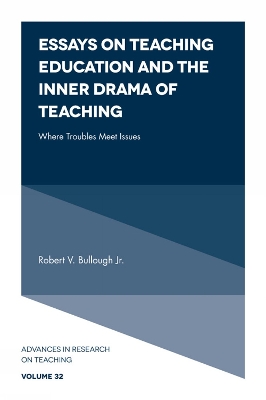Advances in Research on Teaching
1 primary work
Book 32
Essays on Teaching Education and the Inner Drama of Teaching
by Robert V. Bullough Jr.
Published 25 February 2019
The challenges teacher educators face under the influence of
neoliberalism, coupled with select aspects of teachers' genuine experiences of
teaching, is an area that has been neglected and is often under appreciated.
Arguing for greater attention to and awareness of educator
well-being as crucially important to quality education, Essays on Teaching Education and the Inner Drama of Teaching
comprises 11 essays that address and illuminate the place where troubles and
issues, biography and history meet in the lives of Educators. The book is
separated into two parts. Beginning with a critical analysis of Neoliberalism,
in Part 1, Bullough examines the institutional, ideational, and social context
within which educators, live, work and strive to make sense of their
experience. In Part II, he illuminates specific aspects of the experience, the
inner drama of teaching, emphasizing troubles, whilst seeking to elevate these
troubles as issues. In conjunction, the essays seek to expose assumptions and
ideas that enjoy taken-for-granted status in educational thought and practice.
By locating tensions between troubles and issues, biography and history, the
work intends to honor the life experiences of educators and students while recognizing
that within their experience reside the seeds of a potentially powerful and
compelling criticism. In these tensions, there resides hope.
neoliberalism, coupled with select aspects of teachers' genuine experiences of
teaching, is an area that has been neglected and is often under appreciated.
Arguing for greater attention to and awareness of educator
well-being as crucially important to quality education, Essays on Teaching Education and the Inner Drama of Teaching
comprises 11 essays that address and illuminate the place where troubles and
issues, biography and history meet in the lives of Educators. The book is
separated into two parts. Beginning with a critical analysis of Neoliberalism,
in Part 1, Bullough examines the institutional, ideational, and social context
within which educators, live, work and strive to make sense of their
experience. In Part II, he illuminates specific aspects of the experience, the
inner drama of teaching, emphasizing troubles, whilst seeking to elevate these
troubles as issues. In conjunction, the essays seek to expose assumptions and
ideas that enjoy taken-for-granted status in educational thought and practice.
By locating tensions between troubles and issues, biography and history, the
work intends to honor the life experiences of educators and students while recognizing
that within their experience reside the seeds of a potentially powerful and
compelling criticism. In these tensions, there resides hope.
